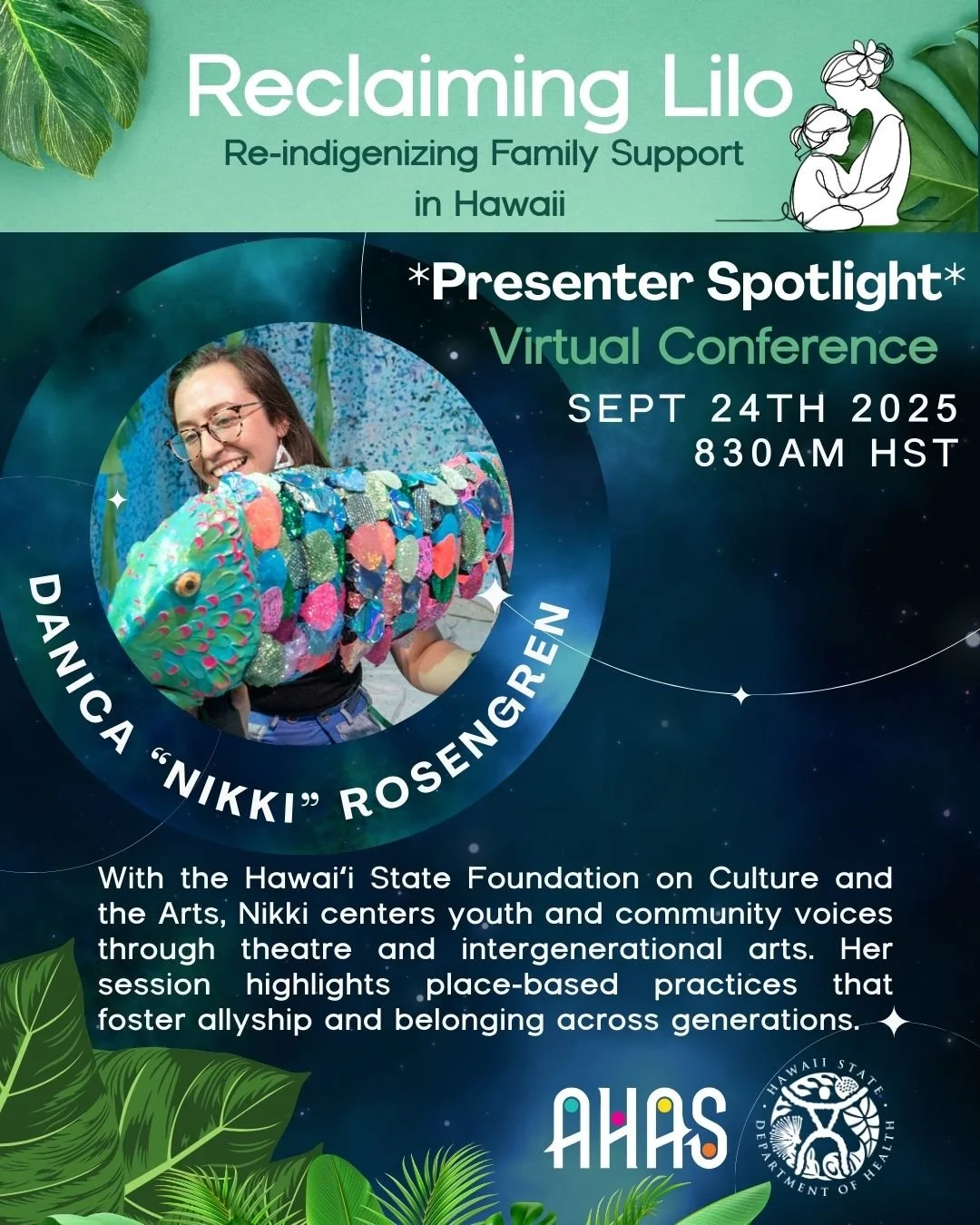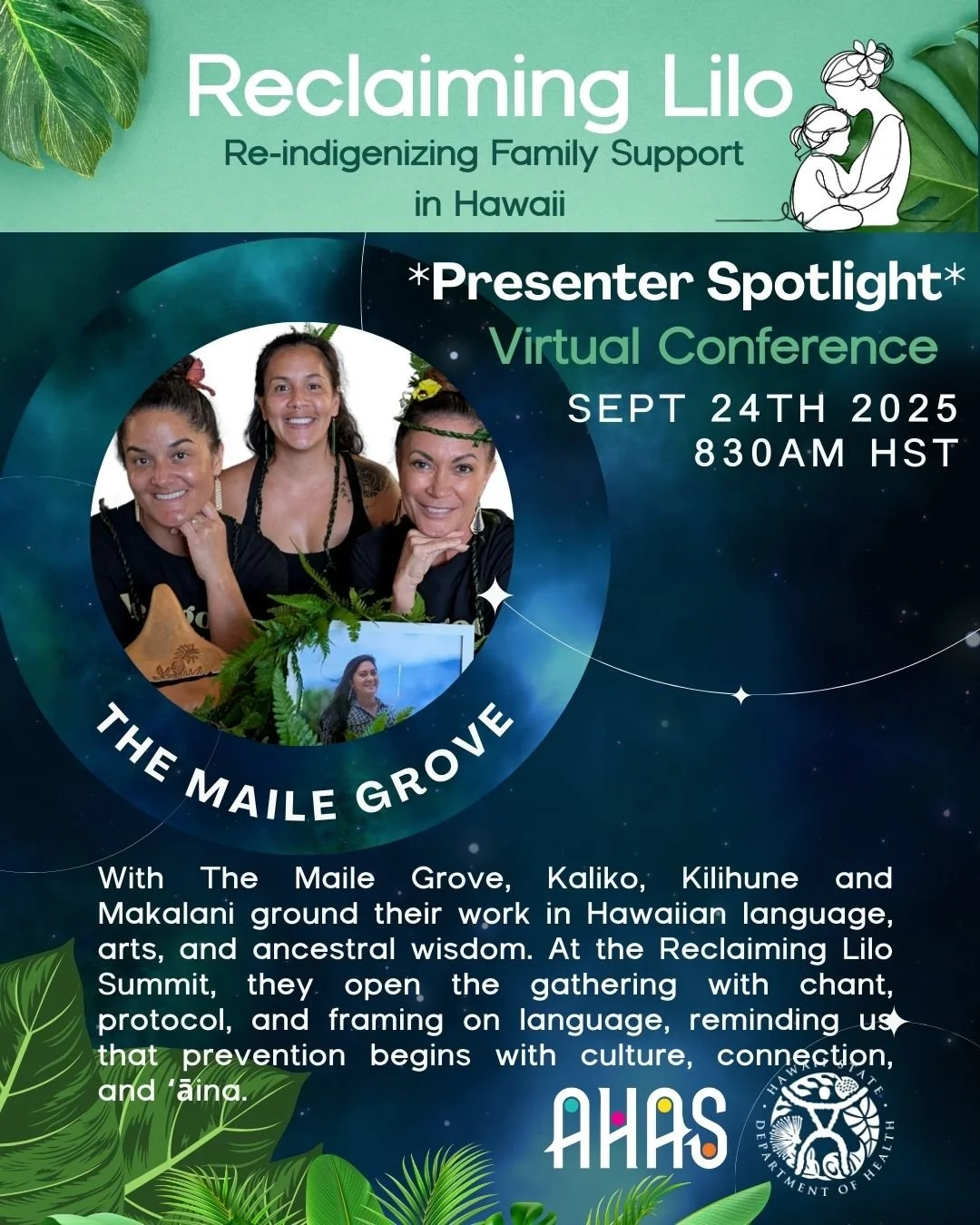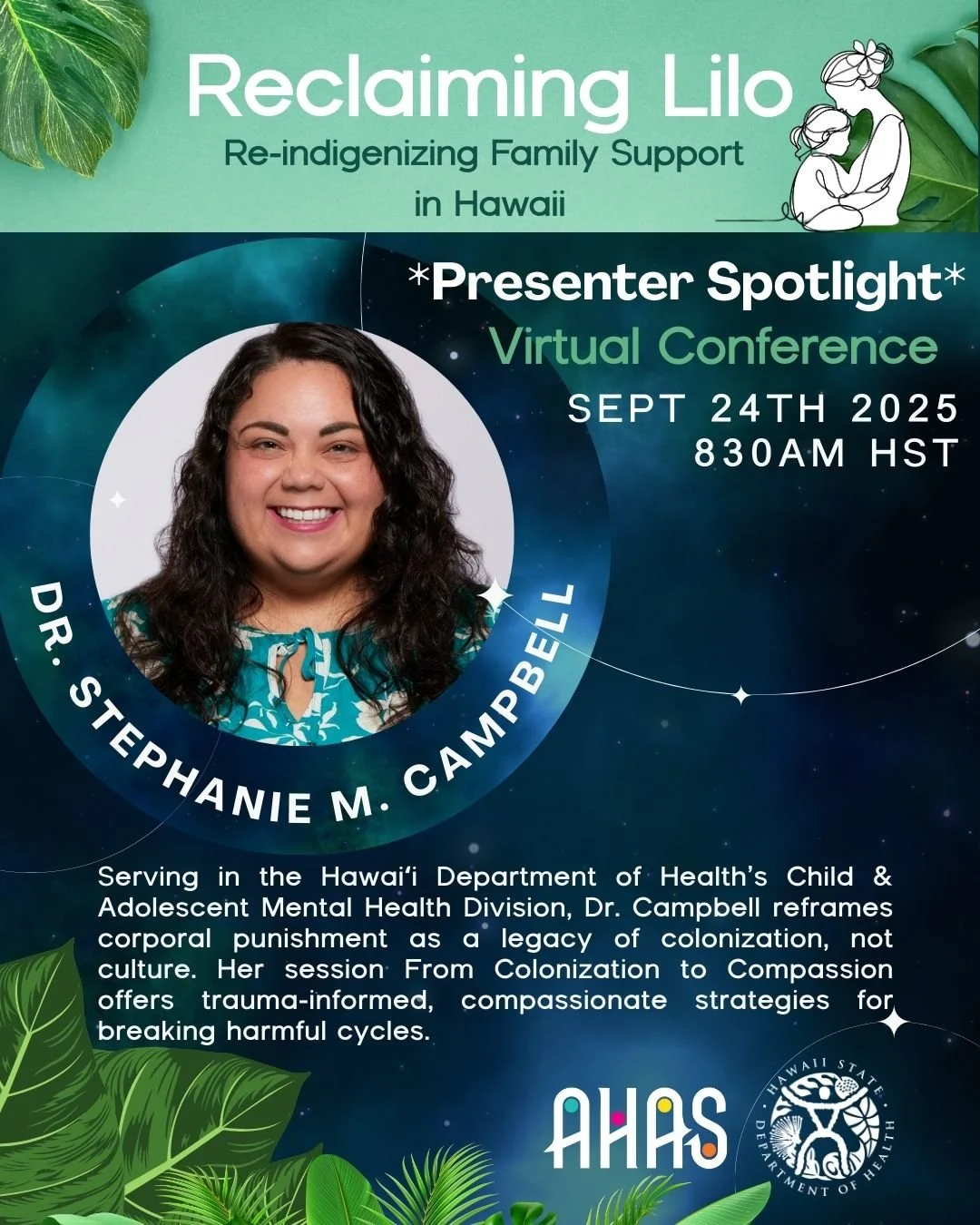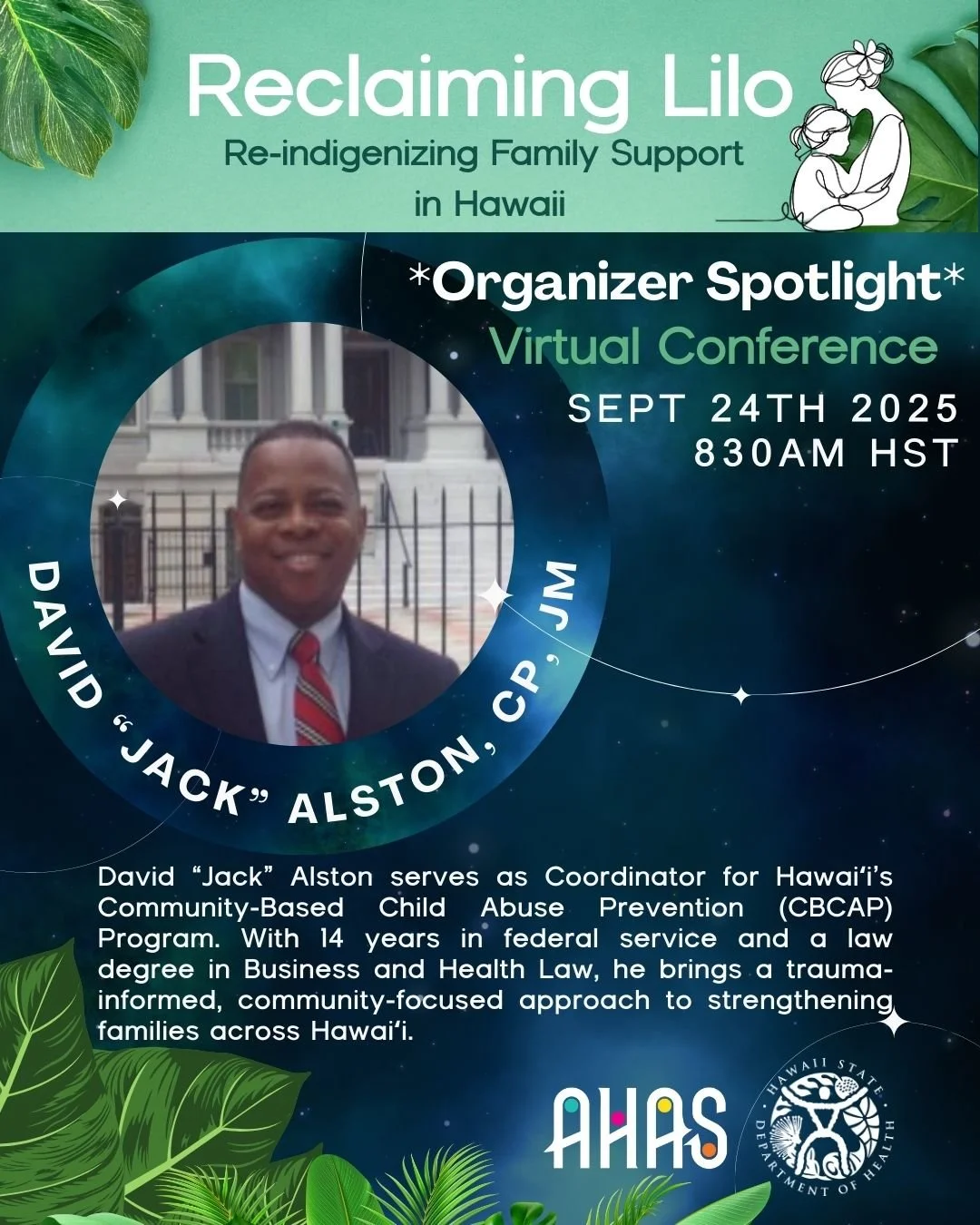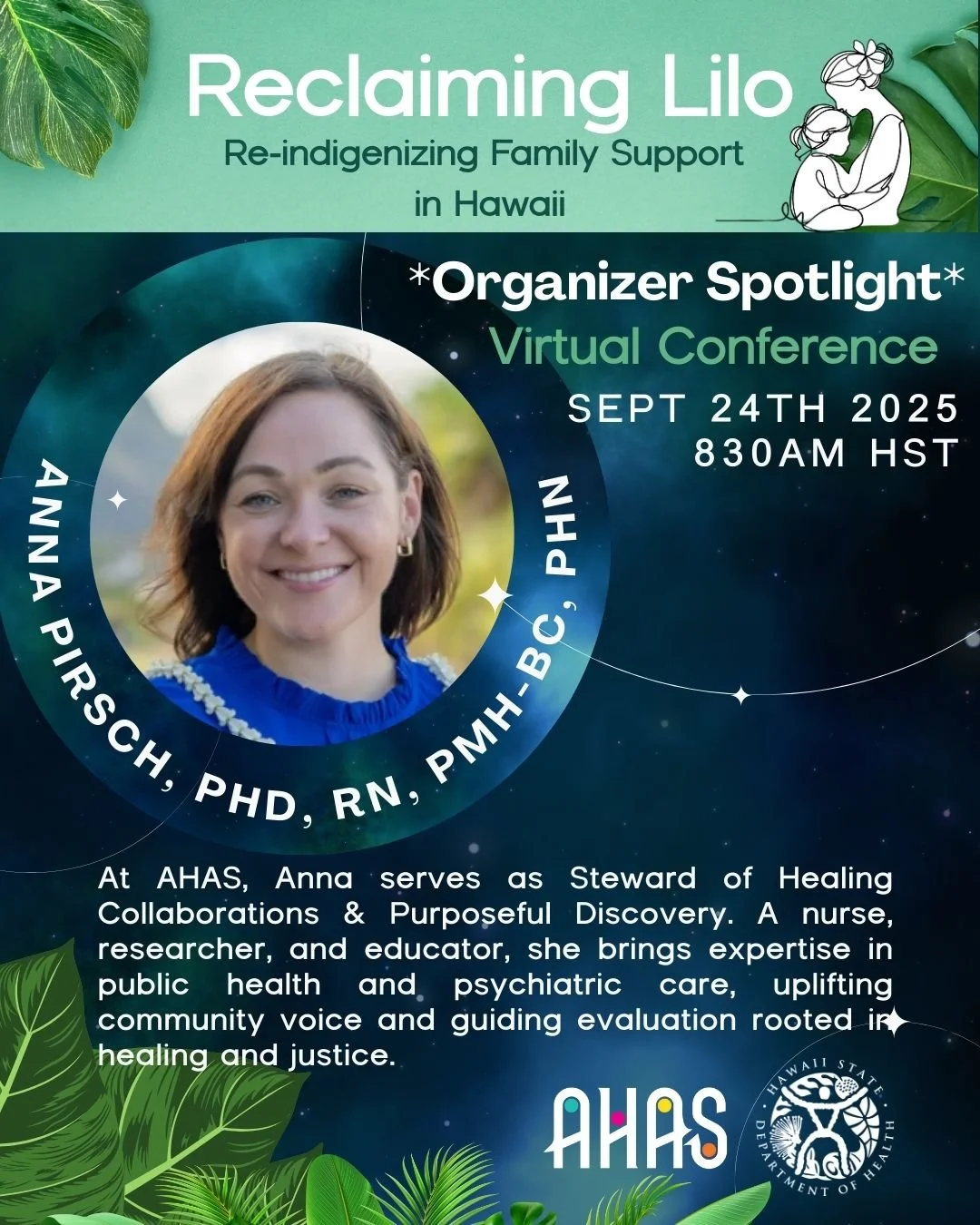
Re-indigenizing Family Support in Hawai`i
A FREE virtual conference sponsored by the Hawaiʻi State Department of Health's Maternal and Child Health Branch (MCHB), Community Based Child Abuse Prevention Program
September 24, 2025 8:30am - 12:30pm
***Approved for 4 NASW Continuing Education Credits***
A statewide gathering grounded in Indigenous practice and shaped by all of Hawai‘i’s communities, open to all who seek to strengthen family care and reimagine systems of support across the islands.
Reclaiming Lilo is a free virtual summit that brings together healthcare professionals, social service providers, educators and researchers to reimagine child abuse prevention as a sacred, relational practice rooted in Indigenous knowledge systems. Grounded in the wisdom of ancestors and guided by longstanding practice traditions, this gathering centers care that uplifts families, honors community, and restores balance to systems of support. Inspired by the cycles of the mahina (moon) once used across Hawaiʻi to guide healing, birthing, and decision-making, the summit invites participants to engage in cross-sector dialogue, skill-sharing, and reflection. Together, we seek to plant new seeds of wellbeing for the generations to come.
WATCH the Conference
Plenary - Prevention as Relational and Cultural: Cross-Sector Voices Moderator: Hōkū Pavao - Co-Founder, AHAS: Archive for Health, Arts & Spirit
This keynote plenary panel brings together youth, cultural practitioners, and systems leaders to reframe prevention as a deeply relational and cultural practice. Rooted in Indigenous frameworks and community-based approaches, the panel will highlight how peer-to-peer mentoring, cultural grounding through the arts, and cross-sector partnerships can strengthen families and transform systems. Beginning with youth voice, each panelist will share a practice or tradition that shapes their perspective on prevention, followed by concrete examples of cross-sector connection, and a personal commitment to integrating culture, belonging, and relational approaches into prevention work. Cultural Values/Frameworks Referenced: Kuleana (responsibility), Pilina (relationship and connection), ʻOhana (family), ʻIke kūpuna (ancestral knowledge), collective voice and peer mentorship, Nā Hopena A‘o (HĀ), HCAN (Hawai‘i Children’s Action Network) framework

ART BREAK: Umia ka hanu / Hold the breath
This cultural practice session focuses on the breath, exploring how holding and slowly releasing it increases our capacity to be patient, to hold space for others, and to remain steady during challenging times. Participants will practice integrating breath with movement as a way to ground, strengthen resilience, and cultivate presence. Cultural Values/Frameworks Referenced: ʻŌlelo Noʻeau “ʻUmia ka hanu” – hold the breath, be patient
Ke Kaula: Weaving Indigenous Ways of Being and Art to Create Intentional Public Health Systems
This workshop examines how Indigenous knowledge and artistic practices can inform the design of culturally grounded and equity-driven public health systems. Participants will learn some of the strategies the Office of Health Equity uses to transform and enhance public health systems and programs. Cultural Values/Frameworks Referenced: Aloha ʻĀina, Kuleana, Pilina
Centering Place through Intergenerational Arts Experiences: How to support and uplift in allyship
This session highlights place-based arts organizations throughout Hawaiʻi and explores how arts experiences create intergenerational connection and community. Participants will also practice simple theatre-based tools and games that can be used to foster allyship and inclusion. Cultural Values/Frameworks Referenced: Place-based work; HĀ (Nā Hopena Aʻo)
Kūkulu Pilina: Cultivating Relationships through Cross-Sector Partnerships
This session highlights the establishment and work of the Hawaiʻi ʻOhana Support Network (HOSN) and Family Resource Centers (FRCs) through public-private collaboration. It explores how cross-sector partnerships rooted in culture can create systems of care that are less overwhelming and more supportive for families. Cultural Values/Frameworks Referenced: Pilina (relationships), ʻOhana (family), Kākoʻo (support)
The Maui Wildfire Exposure Study: Lessons in Community Health, Trust, and Resilience
This session shares insights from the Maui Wildfire Exposure Study on how disasters affect child and family health, with a focus on resilience, mental health, and systems of care. Through case examples and applied strategies, participants will be invited to reflect on how trust, culture, and community connections can strengthen families in times of crisis. Cultural Values/Frameworks Referenced: Trauma-informed, culturally grounded strategies
Understanding Historical Trauma Among Native Hawaiian Youth
Our session will share findings from a qualitative study on Native Hawaiian youth experiences and understandings of historical trauma. In collaboration with community partners, our team conducted virtual and in-person talk stories with 19 justice-involved Native Hawaiian youth and 15 service providers and legislators. Eight themes emerged confirming that loss of access to land, cultural loss, persistent poverty, and negative impacts of tourism, alcohol use, and escapism, along with feelings of anger, shame, and anxiety, created barriers to them reaching their full potential.
Cultural Values/Frameworks Referenced: Expanded Lokahi Triangle, Talk Story, Reciprocity, Relevance, Respect, Ka Hoʻomana (empowered education), Ke Aloha ʻĀina (love of the land as healing).
Whose Child Is This?: The Complexity of Children in Out-of-Home Placement
This workshop explores the complex realities of children placed in out-of-home care, centering the child’s perspective while recognizing the challenges faced by caregivers, social workers, agencies, and families. Too often, trauma in foster care is addressed primarily through safety and judgment; this session asks participants to expand their lens to include empathy, cultural awareness, and collaborative care. Cultural Values/Frameworks Referenced: Hawaiʻi’s Culture (Kanaka Maoli and the many cultures that influence Hawaiʻi today).
Provider Talk Story: a Kākou for Keiki Community of Care to Support Providers
This workshop creates space for providers who are also caregivers to connect, reflect, and share strategies for building resilience. Participants will discuss burnout and loneliness while practicing tools that help restore energy and foster deeper connections. Cultural Values/Frameworks Referenced: Aloha Circle, Kilo, Pilina, “I Ola ʻOe, I Ola Mākou Nei”
Pā Pōhaku: A Kākou for Keiki Community of Care to Support Fathers
Pā Pōhaku is a free virtual gathering space for fathers of keiki under five in Hawaiʻi. This session shares the inspiration, cultural grounding, and partnerships that helped bring it to life, and explores how creating father-centered spaces strengthens families and communities. Cultural Values/Frameworks Referenced: Pilina, Kuleana, ʻOhana
Creativity as Medicine: The Healing Power of Expressive Arts
This fully experiential workshop invites participants to engage in the expressive arts through visualization, writing, drawing, and reflection. Using the Tree of Wellbeing activity, participants will explore identity, strengths, hopes, and sources of support, leaving with a visual reminder of their resilience and capacity for growth. Cultural Values/Frameworks Referenced: Indigenous wisdom, expressive arts as ancestral practice
Culture, Indigenous Wisdom, and Wellbeing
This interactive session explores the ongoing impacts of colonialism on children and youth, while drawing on Sikolohiyang Pilipino (Indigenous Filipino Psychology) as a source of strength, honor, and wellbeing. Participants will collectively explore and share practices that help reclaim spirituality and resilience for keiki, families, and communities. Cultural Values/Frameworks Referenced: Sikolohiyang Pilipino (Indigenous Filipino Psychology)
From Colonization to Compassion: Reframing Corporal Punishment in Hawaiʻi
Practices of physical discipline, often learned from one’s own upbringing, perpetuate cycles of trauma across generations. Despite being seen as cultural, corporal punishment is not a Hawaiian or Pacific cultural practice; it is tied directly to legacies of settler colonialism and human enslavement. This session will increase understanding of this history and offer compassion-focused, trauma-informed strategies to help caregivers break these cycles and build healthier relationships. Cultural Values/Frameworks Referenced: Resistance to past influences of colonization; compassion-focused, trauma-informed practice.
Creativity as Co-Regulation: Resourcing our Caregivers
This session begins with data on intergenerational trauma and barriers to caregiver mental health. It then introduces evidence-based co-regulation skills, before expanding into place-based creative activities that providers and families can use to resource themselves and build resilience. Cultural Values/Frameworks Referenced: Creativity and art within ʻohana as resilience; mirror neurons and generational trauma

Detailed Schedule
8:25 AM - 8:50AM
Opening + Cultural Protocol
8:25–8:30 | Zoom Room Opens
8:30–8:35 | Welcome + Housekeeping - Host Team (Moira, David) | Agenda + tech info
8:35–8:45 | Opening Protocol + Oli + Framing on Language - The Maile Grove
8:45–8:50 | Opening Remarks - David Alston (DOH) | Partnership Acknowledgment
8:50 AM – 10:25AM
Plenary - Prevention as Relational and Cultural: Cross-Sector Voices
Keynote Panel (moderated by Hōkū Pavao)
Panelists :
Ashley Tone with Peer Mentor - Lines for Life / YouthLine (peer-to-peer perspective)
Kalikolehuanani Kaauamo - The Maile Grove (cultural arts & grounding)
Kukunaokalā Yoshimoto - Blueprint for Change & Hawaiʻi ʻOhana Support Network (cross-sector, re-indigenizing services)
Focus: Cross-cultural frameworks for prevention; relational and cultural practice; shared commitments.
10:25 AM –10:30AM
Art Wellness Break: “Reclaiming Lilo” Poem - TravisT
10:30 AM – 11:15 AM
Concurrent Workshops - Round One
Participants choose 1 of 6 breakout sessions:
Ke Kaula: Weaving Indigenous Ways of Being and Art to Create Intentional Public Health Systems
- Katia Pōhaikealoha Worley (DOH – Office of Health Equity)Centering Place through Intergenerational Arts Experiences: How to support and uplift in Allyship
- Danica Rosengren (Hawaiʻi State Foundation on Culture and the Arts)Kūkulu Pilina: Cultivating Relationships through Cross-Sector Partnerships
- Kukunaokalā Yoshimoto (Blueprint for Change & Hawaiʻi ʻOhana Support Network)The Maui Wildfire Exposure Study: Lessons in Community Health, Trust, and Resilience
- Dr. Ruben Juarez (University of Hawaiʻi)
- Anamalia Suʻesuʻe; Kristina “Tina” Hulama; Lorinda Riley (Department of Psychology, Department of Public Health Sciences, University of Hawaiʻi at Mānoa; Department of Social Work, Denver University; Department of Public Health Sciences/Kamakūokalani Center for Hawaiian Studies, University of Hawaiʻi Mānoa)
6. Whose Child Is This?: The Complexity of Children in Out of Home Placement
- Lani Bowman (SET ITUP!)
11:15 AM –11:25 AM
Art Wellness Break: ʻUmia ka hanu / Hold the breath - Christopher K. Morgan
11:25 AM – 12:10 PM
Concurrent Workshops - Round Two
Participants choose 1 of 6 breakout sessions:
Provider Talk Story: a Kākou for Keiki Community of Care to Support Providers
- Kaʻiulani Galon (Kākou for Keiki)Pā Pōhaku: A Kākou for Keiki Community of Care to Support Fathers
- Jessica Kaneakua (Kākou for Keiki)Creativity as Medicine: The Healing Power of Expressive Arts
- Ann Davis & Heidi Allencastre (Family Hui Hawaiʻi)Culture, Indigenous Wisdom, and Wellbeing
- Ivee Cruz (University of Hawaiʻi)From Colonization to Compassion: Reframing Corporal Punishment in Hawaiʻi
- Stephanie M Campbell (HI Dept of Health, Child & Adolescent Mental Health Division)
Creativity as Co-Regulation: Resourcing our Caregivers (Virtual On-Demand)
- Noelani I. Anderson (Hawaiʻi Behavioral Health Connection)
12:10 PM – 12:30 PM
Closing Session
12:10–12:20 | Sensemaking “What did we experience? What connections did we make?” - Hōkū Pavao
12:20–12:25 | Closing + Mahalo - Maile Grove
12:25–12:30 | Pau + Survey - Zoom closes




